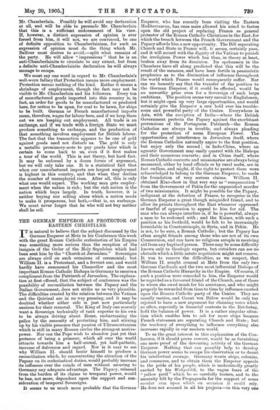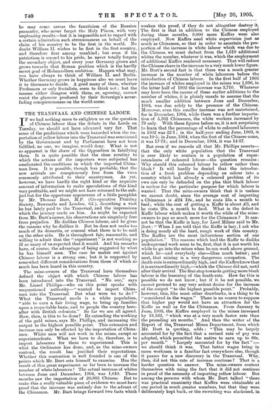I T is natural to believe that the subject discussed by
the German Emperor at Metz iu his Conference this week with the great Roman Catholic ecclesiastics of his Empire was something more serious than the reception of the insignia, of the Order of the Holy Sepulchre which had been sent him by the " Church at Jerusalem." Sovereigns are always civil on such occasions of ceremonial; but William II. is a Protestant, and a fervent one, and would hardly have summoned his Chancellor and the most important Roman Catholic Bishops in Germany to receive a compliment from the Patriarch of Jerusalem. The explana- tion at first offered, that the subject of conference was the possibility of reconciliation between the Papacy and the Italian Government, does not strike us as very plausible. The difficulties created by the relation between the Vatican and the Quirinal are in no way pressing, and it may be doubted whether either side is just now particularly anxious for their removal. The King of Italy can scarcely want a Sovereign technically of rank superior to his own to be always driving about Rome, embarrassing the police by the necessity of protecting him, and stirring up by his visible presence that passion of 171pramontanism which is still in many Roman circles the strongest motive- power. Nor can the Pope wish to abandon just yet that pretence of being a prisoner, which all over the world attracts towards him a half-unreal, yet half-pathetic, increase of deference and regard. Nor is it easy to see why William II. should bestir himself to produce a reconciliation which, by concentrating the attention of the Papacy on its ecclesiastical duties, would probably increase its influence over the minds of men without securing to Germany any adequate advantage. The Papacy, released from the burden of its claims to temporal power, would be less, not more, dependent upon the support and con- sideration of temporal Sovereigns.
It seems to us much more probable that the German Emperor, who has recently been visiting the Eastern Mediterranean, has once more allowed his mind to fasten upon the old project of replacing France as general protector of the Roman Catholic Christians in the East, for which the breach between the French Government and the Papacy affords him a new opportunity. The Bill separating Church and State in France will, it seems, certainly pass, and it will accord with the dignity of the Vatican to punish the irreligious Power which has thus, in theory at least, broken away from its dominion. Its spokesmen in the Chambers have all along predicted that this will be the result of the measure, and have been fertile in pessimistic prophecies as to the diminution of influence throughout the world which France would consequently suffer. Nor can we honestly say that the transfer of the position to the German Emperor, if it could be effected, would be an unworthy prize even for a Sovereign of such large ambitions. The position seems very unreal to Englishmen, but it might open up very large opportunities, and would certainly give the Emperor a new hold over his trouble- some and powerful party of the Centre. Everywhere in Asia, with the exception of India—where the British Government protects the Papacy against the exorbitant pretensions of the Portuguese Patriarch—the Roman Catholics are always in trouble, and always pleading for the protection of some European Power. The opportunities of interference in Jerusalem itself, where the Roman Catholics naturally aspire to the first position, but enjoy only the second ; in Indo-China, where an agnostic Government may easily quarrel with the Bishops and their numerous converts ; and in China itself, where Roman Catholic converts and missionaries are always being massacred, either by local officials or by rural mobs, are in fact endless, and might, if the right to protect them were acknowledged to belong to the German Emperor, be made the foundation of very serious claims. William II. obtained Kiao-chow in that very way as " compensation " from the Government of Pekin for the unpunished murder of two missionaries. It might be possible for the Papacy, indignant at the defection of France, to recognise in the German Emperor a great though misguided friend, and to allow its priests throughout the East whenever oppressed or fearful of oppression to appeal to him for aid. The man who can always interfere is, if he is powerful, always a man to be reckoned with ; and the Kaiser, with such a position as his foothold, would be felt to be increasingly formidable in Constantinople, in Syria, and in Pekin. He is not, to be sure, a Roman Catholic ; but the Papacy has often sought friends among those who are not of its own Communion, and can have no religious scruple in receiving aid from any baptised person. There may be some difficulty known only to theologic experts, but outsiders can see no obstacle which a little astute negotiation might not remove. It was to remove the difficulties, as we suspect, that William II. sought counsel at Metz from the only two German Cardinals and the two most influential Bishops of the Roman Catholic Hierarchy in the Empire. Of course, if such a position were conceded to him, the Emperor would be regarded as a favoured friend of the Church, one of those to whom she owed much for his assistance, and who might properly be rewarded from time to time by influence exerted upon the Roman Catholic party of the Centre. They are usually restive, and Count von Billow would be only too rejoiced to have a uew argument for claiming votes which so often, especially in financial contests in the Reichstag, hold the balance of power. It is a rather singular situa- tion which enables him to ask for more ships because French statesmen are separating Church and State ; but the tendency of everything to influence everything else increases rapidly in our modern world.
To us the great interest in this explanation of the Con- ference, if it should prove correct, would be as furnishing one more proof of the devouring activity of the German Emperor. Nothing that can possibly help to develop German power seems to escape his observation or to daunt his intellectual courage. Germany wants ships, colonies, and commerce, and to obtain them the Emperor appeals to the pride of his people, which is undoubtedly greatly excited by his Weltpolitik, to the vague fears of the " yellow peril " which he so carefully fosters, and to the necessity felt by the Propaganda for the support of some secular arm upon which on occasion it could rely. He does not succeed in all his projects—in this very one he may come across the fanaticism of the Russian peasantry, who never forget the Holy Places, with very unpleasing results—but it is impossible not to regard with a certain admiration such strenuousness on behalf of the claim of his country to be the first in the world. No doubt William II. wishes to be first in the first country, and therefore first among mankind ; but even if his patriotism is second to his pride, he never totally forgets the secondary object, and every year Germany grows and grows towards that Roman position which is the hardly secret goal of Hohenzollern ambition. Happen what may, you have always to think of William II. and Berlin. Whether Germany grows in happiness also we must leave it to Germans to decide. A good many of them, whether Professors or only Socialists, seem to think not ; but the masses either disagree with them, or, agreeing, cannot resist the glamour produced by their Sovereign's never- fading conspicuousness on the world-scene.
THE TRANSVAAL AND CHINESE LABOUR.







































 Previous page
Previous page